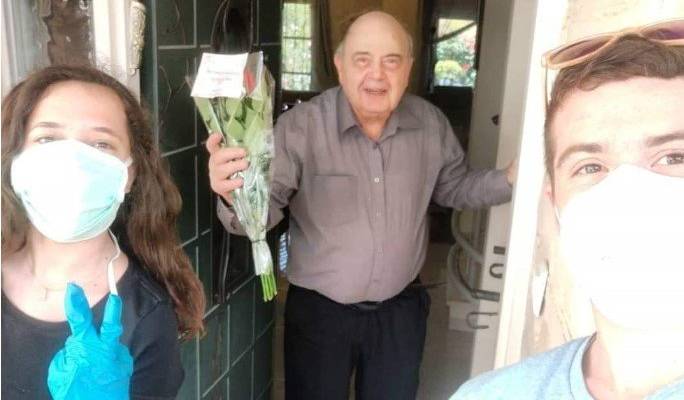With seniors hit particularly hard by the coronavirus and limits on social contact and movement, Israeli teens are pitching in to safeguard the health and welfare of the elderly.
By Tsivya Fox-Dobuler
Nine months ago, Tuvia Roness, 18, could not imagine that an idea conjured up with a couple of friends to connect youth with seniors for fun and companionship would flourish into a country-wide program. A mere few months later, nine Israeli cities are running similar programs that benefit teens and elderly alike.
The program has become especially crucial during the coronavirus pandemic.
“Israel offers many opportunities for youth to volunteer, such as in hospitals, Magen David Adom emergency medical services, in schools and with the disabled,” Roness told United with Israel (UWI). “However, there weren’t many organizations connecting youth with the elderly even though there is a need.”
Roness and his friends brainstormed a program that would be fun and interactive for young and old alike. They created its name, “Sababta,” by combining the Hebrew words for grandfather (saba), grandmother (savta), and fun (sababa).
“The kids originally volunteered because they wanted to do good but now they realize how much everyone is benefiting from the program,” Roness continued.
Sababta began with seniors and youth meeting one time per week either in a park, weather permitting, or at the local community center. The elders told their stories to the teens, everyone played board games or cards and friendships developed. The teens even took responsibility for providing full transportation for those who needed, without charge, by having their parents do the pick ups and drop offs.
Tikvah Slifkin, 17, joined Sababta at its inception. “Everyone in the program is supposed to be in 12th grade,” the 11th grader told UWI. “I wanted to volunteer but was a bit too young. My grandmother had just moved to Israel and needed to make friends so I took her to the program. She quickly made so many new friends there and it really helped her to acclimate to life here.”
The teen shared with UWI that one of the elderly participants said that even though the group only meets one time per week, it gives him something to look forward to on other days. “The little things we are doing change the way we all look at our lives every single day,” she said.
“I wanted to get more involved and they bent the rules and let me volunteer,” Slifkin said. “Everything is for the best as next year, all the 12th grade volunteers need to join the army and I will be leading the program!”
Israeli Citizens Step Up During Corona Crisis
Neither the young volunteers nor the participants wanted their relationships or the program to end in light of coronavirus, which brought with it not only a major public health threat but also a nationwide lockdown that is particularly challenging for seniors who may feel isolated, alone and unable to handle day-to-day affairs independently.
Israel’s primary rescue and recovery volunteer organization ZAKA chairman Yehuda Meshi-Zahav called leaving seniors alone during the crisis “a ticking time bomb,” Arutz7 reported on Wednesday. “The elderly and those living alone are so vulnerable, especially at this time,” he said. “Just one call a day could save a life.”
He urged all Israelis to be mindful of those living alone and to reach out with a daily phone call.
Sababta’s teens were ahead of the situation. “We knew at the start of the government’s regulations that we had to find a way to help our senior friends with their loneliness and their daily needs without endangering their lives,” Roness said.
“We notified every participant and told them that we are here for them for anything they need. We also call every day to chat and check-in,” she added.
Wearing protective masks and gloves, the teen volunteers run errands to supermarkets and pharmacies and deliver requested items to seniors. They even take out the garbage and bring mail to the door.
“These kids are so amazing and reliable,” gushed Sandy Woolf. “If I tell them I need something, they show up right away, take my list and deliver whatever it is back to my front door, leaving it on the porch. They have gone food shopping for me, to the pharmacy and even delivered a bouquet of flowers for Passover.”
Woolf was one of 200 recipients of flowers for Passover in the Beit Shemesh area alone.
“Passover was particularly hard on the elderly who normally would have spent the holiday with their grandchildren or friends,” Slifkin said. “We wanted to do something extra to put a smile on their faces and let them know we care. We raised the money needed to get the bouquets, donned masks and gloves, got into a bunch of cars and hand delivered the flowers. It was so special to see people’s reactions. They were so happy and surprised.”
Hearing about the dedicated youth of Sababta, municipalities and social workers throughout Israel have expanded the group’s list of seniors. They have also added disabled people to the lists so that anyone who needs help can get it.
“It’s fabulous how people who didn’t know each other just a few weeks ago are now friends,” Roness said. “We are constantly thinking of better ways to keep people connected, safe and cared for. Of course, everyone is looking forward to being under one roof together again once the coronavirus crisis is over. Hopefully, that will be soon.”










